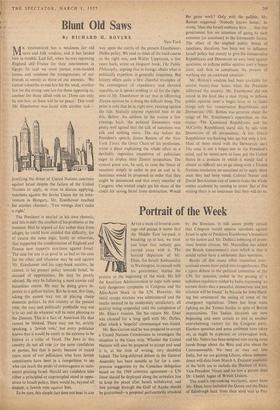Blunt Old Saws
By RICHARD II. ROVERE MR. EISENHOWER has a weakness for old saws and folk wisdom, and it has landed him in trouble. Last fall, when he was reproving England and France for their intervention in Egypt, • he said we must pursue even-handed justice and condemn the transgressions of our friends as sternly as those of our enemies: 'We cannot subscribe to one law for the weak„another law for the strong; one law for those opposing us, another for those allied with us. There can only be one law, or there will be no peace.' This week Mr. Eisenhower was faced with another task — justifying the threat of United Nations sanctions against Israel despite the failure of the United Nations to apply, or even to discuss applying, sanctions against the Soviet Union for its inter- vention in Hungary. Mr. Eisenhower reached for another chestnut: 'Two wrongs don't make a right.'
The President is snarled in hi§ own rhetoric, and this is only the smallest of his problems at the moment. Had he argued ad hoc rather than from adages, he could have avoided this difficulty, for of course. the same logic, faulty or otherwise, that supported the condemnation of England and France now supports sanctions against Israel. The case for one is as good or as bad as'the case for the other, and whateirer may be said against Mr. Eisenhower and his. copy-book maxims, he cannot, in his present policy towards Israel, be accused of opportunism. He may be poorly advised. He may be following a most unwise and hazardous course. He may be doing grave in- justice to a gallant nation. But he is not, this time, taking the easiest way out or playing cheap domestic politics. In this country at the present time, the easy and politically profitable way out is to say and do whatever will be most pleasing to the Zionists. This is a fact of American life that cannot be blinked. There may not be, strictly speaking, a 'Jewish vote,' but every politician knows that it would be costly in the extreme to be known as a 'critic of Israel. The Jews in this country do not all vote for the same candidates or parties, but that is partly because in recent years most of our politicians who have Jewish constituents have been in a competition to see who can reach the peaks of extravagance in state- ments praising Israel. Should any candidate take either a principled or unprincipled stand in oppo- sition to Israeli policy, there would be, beyond all dispute, a Jewish vote against him.
To be sure, this simple fact does not bear in any New York way upon the merits of the, present Eisenhower- Dulles policy, We tend to think of the hard course as the right one, and Walter Lippmann, a few years back,, wrote an eloquent book, The Public Philosophy, arguing that in foreign affairs what is politically expedient is generally iniquitous. But history offers quite a few cheerful examples of the convergence of expediency , and elevated morality, so it speaks nothing at all for the right- ness of Mr. Eisenhower to say that in affronting Zionist opinion he is doing the difficult thing. The point is only that he is, right now, running against the tide. Scarcely anyone expected him to do this. Before his address to the nation a few evenings back, the political forecasters were pretty well agreed that the talk of sanctions was talk and nothing more. The day before the President's speech, James Reston of the New York Times, the Great Chain of his profession, wrote a piece explaining the whole affair as a devilishly ingenious manoeuvre of politicians eager to display their Zionist sympathies. The cynical game was, he said, to raise the threat of sanctions simply in order to put an end to it. Sanctions would be proposed in order that they might be denounced and that every member of Congress who wished might get his share of the credit for saving Israel from destruction. Would the game work? Only with • the gullible, Mr. Reston, suggested. `Nobody knows better,' he wrote, 'than the Israeli embassy here . that this government has no intention of going to such extremes [as sanctions] in the foreseeable future. The effect of the implied public threat of sanctions, therefore, has been not to influence Israeli policy but merely to give the conservative Republicans and Democrats an easy issue against sanctions, to inflame public opinion over a bogus issue, and thus to complicate the process of working out an awkward situation.'
Mr. Reston's analysis had been available for almost twenty-four hours when the President addressed the country. Mr. Eisenhower did not sound in the least like a man trying to inflame public opinion over a bogus issue or to make things soft for 'conservative Republicans and Democrats.' (Mr. Reston was accurate about the - range of Mr. Eisenhower's opposition on this matter. The Knowland Republicans and the McCarthy Republicans stand side by side with Democrats of all persuasions. A few liberal Republicans are backing him up, but only a few. Most of them stand with the Democrats too.) The issue is not a bogus one in the President's mind, and he seems now to have put the United States in a position in which it would find it almost as difficult not to go along-with a -United Nations resolution, on sanctions as to apply them once they had been voted. Colonel Nasser and David Ben-Gurion can of course make the whole matter academic by coming to terms. But at this writing there is no assurance that they will do so.


































 Previous page
Previous page